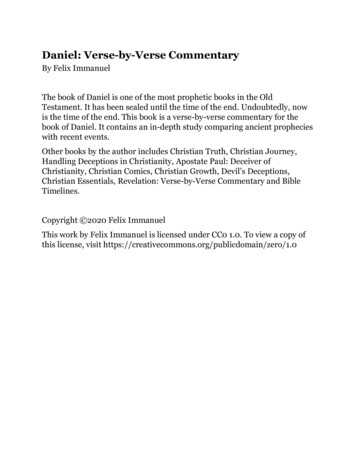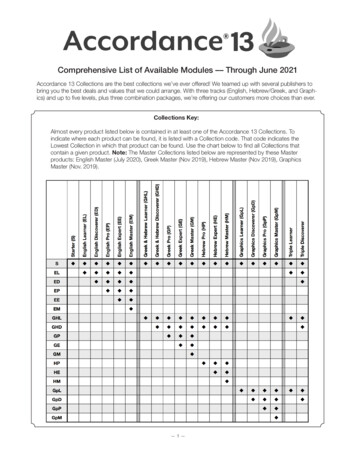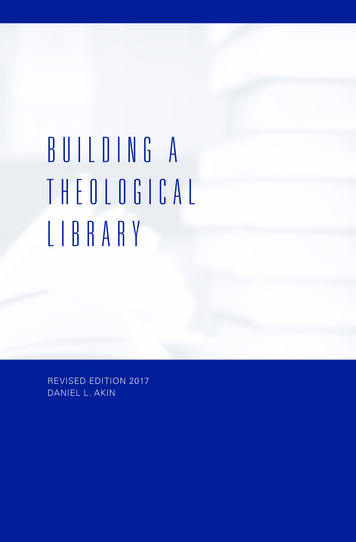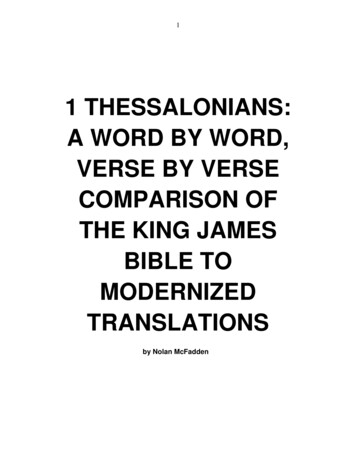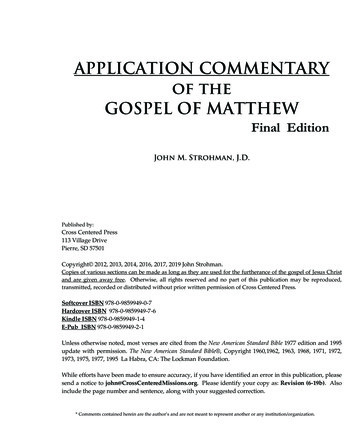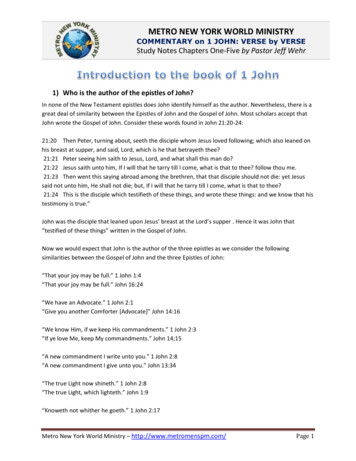
Transcription
METRO NEW YORK WORLD MINISTRYCOMMENTARY on 1 JOHN: VERSE by VERSEStudy Notes Chapters One-Five by Pastor Jeff Wehr1) Who is the author of the epistles of John?In none of the New Testament epistles does John identify himself as the author. Nevertheless, there is agreat deal of similarity between the Epistles of John and the Gospel of John. Most scholars accept thatJohn wrote the Gospel of John. Consider these words found in John 21:20-24:21:20 Then Peter, turning about, seeth the disciple whom Jesus loved following; which also leaned onhis breast at supper, and said, Lord, which is he that betrayeth thee?21:21 Peter seeing him saith to Jesus, Lord, and what shall this man do?21:22 Jesus saith unto him, If I will that he tarry till I come, what is that to thee? follow thou me.21:23 Then went this saying abroad among the brethren, that that disciple should not die: yet Jesussaid not unto him, He shall not die; but, If I will that he tarry till I come, what is that to thee?21:24 This is the disciple which testifieth of these things, and wrote these things: and we know that histestimony is true.”John was the disciple that leaned upon Jesus’ breast at the Lord’s supper . Hence it was John that“testified of these things” written in the Gospel of John.Now we would expect that John is the author of the three epistles as we consider the followingsimilarities between the Gospel of John and the three Epistles of John:“That your joy may be full.” 1 John 1:4“That your joy may be full.” John 16:24“We have an Advocate.” 1 John 2:1“Give you another Comforter [Advocate]” John 14:16“We know Him, if we keep His commandments.” 1 John 2:3“If ye love Me, keep My commandments.” John 14;15“A new commandment I write unto you.” 1 John 2:8“A new commandment I give unto you.” John 13:34“The true Light now shineth.” 1 John 2:8“The true Light, which lighteth.” John 1:9“Knoweth not whither he goeth.” 1 John 2:17Metro New York World Ministry – http://www.metromenspm.com/Page 1
1 John Commentary: Verse by Verse – Chapters 1-5“Knoweth not whither he goeth.” John 12:35“Whosoever denieth the Son, the same hath not the Father.” 1 John 2:23“He that hateth me hateth my Father also.” John 15:23“We have passed from death unto life.” 1 John 3:14“Is passed from death unto life.” John 5:24“This life is in his Son.” 1 John 5:11“In Him was life.” John 1:4There are many more similarities between the Epistles of John and the Gospel of John. Consider howboth of these books begin:“That which was from the beginning . the Word of life.” 1 John 1:1“In the beginning was the Word.” John 1:1There are other similarities, such as, style, vocabulary, the order of words, the use of prepositions, andgrammatical constructions. We have the same pairing of opposites, such as, darkness versus light, deathversus life, and hate versus love.Whatever the differences between the Epistles of John and the Gospel of John are not proof of adifferent author, but of differing objectives, date of composition, and the advancing age of John.2) What is the most likely date of the epistles?The Epistles of John were written around 90 AD, if not even at a later date like 95 AD.Since the Epistles of John do not contain specific reference to John as the author, to the place fromwhich it was written, or to the time it was writing, we must look for some internal evidence itself.John may have been up in years since he refers to the readers as “little children.” (1 John 2:1, 12, 18;3:7, 18; 4:4; 5:21). We also notice that there was no reference to the fall of Jerusalem in 70 AD. Thisdoes not prove that the epistle was written at a later date, but it could indicate that the church hadalready adjusted to this terrible calamity.3) Why was I John written?The general aim of the epistle and the Bible is fellowship with God and our fellow man. 1 John 1:3 (Moreon this point later.)Metro New York World Ministry – http://www.metromenspm.com/Page 2
1 John Commentary: Verse by Verse – Chapters 1-5There are also varied references to false teachers and false doctrines. 2:18, 19; 4:1. It is clear thatheresies had troubled the church, and that false teachers from within had tried to subvert the faith (1John 2:18, 19). Although they had left the church, their influence lingered and threatened the church.John writes to counteract this danger, to establish the body of Christ on the essentials of the Christianfaith, and to make the truth so attractive that none would want to deny it, change it, or leave it.Some of these false teachers taught that Christ had a different human nature than you and me. Tocombat these errors, John stresses the reality of Christ’s visible human nature during the incarnation (1John 1:1-3), that He did come in the flesh (1 John 4:2), and that believers may enjoy this true knowledge(1 John 5:20).The Epistles of John are pastoral in nature. So John would write lovingly to these “little children” orspiritual children of God. Therefore, he emphasizes that “God is love,” (1 John 4:8) and that “love is ofGod” (1 John 4:7). God loved us and therefore we should love one another (1 John 4:10, 11). Yet thislofty theme of love is in contrast to the much opposition from within.4) John tells us what his primary objectives of writing I John. We will considerthree of them:First, John writes that our joy may be complete.“And these things write we unto you, that your joy may be full.” 1 John 1:4This should be our objective also in whatsoever we say and do.Second, John is writing to exhort us not to sin.“My little children, these things write I unto you, that ye sin not.” 1 John 2:1This should also be our objective in whatsoever we say and do.Third, John is writing so that you might know that you have eternal life.“These things have I written unto you that believe on the name of the Son of God; that ye mayknow that ye have eternal life, and that ye may believe on the name of the Son of God.” 1 John5:13Purpose statement: The purpose of John’s epistles were to sustain Christians in their fellowship withGod and other believers, especially in the face of conflict, that they might be equipped to stand againstfalse teachers and false doctrines that would disrupt their blessed fellowship with God and one another.Metro New York World Ministry – http://www.metromenspm.com/Page 3
1 John Commentary: Verse by Verse – Chapters 1-55) What is the key word for I John?The key word is “fellowship.” 1 John 1:3The word fellowship comes from the Greek word “koinonia.” Koinonia is best described as somethingthat is shared between two persons. So when the Bible says that we are to have fellowship (koinonia)with the Father, it means that we will share something in common with the Father. When it says thatwe are to have fellowship (koinonia) with the Son, we are to share something in common with Jesus.What will we share in common? God wants to share His altogether beautiful character qualities oflove, joy, peace, mercy, humility, etc. In other words, we may have the humility of Jesus because Hewill share His humility with us through the work of the Holy Spirit. He will share His love with us. Hewill share His patience with us. If we need patience then we may receive the perfect patience of Jesus.Chapter One of First JohnIntroduction: 1:1-41:1That which was from the beginning, which we have heard, which we have seen with our eyes,which we have looked upon, and our hands have handled, of the Word of life;1:2(For the life was manifested, and we have seen it, and bear witness, and show unto you thateternal life, which was with the Father, and was manifested unto us;)1:3That which we have seen and heard declare we unto you, that ye also may have fellowship withus: and truly our fellowship is with the Father, and with his Son Jesus Christ.1:4And these things write we unto you, that your joy may be full.John begins his first epistle with “that which was.” This is in reference to Jesus, who is the Word oflife.“That which was from the beginning,” John establishes the preexistence of Christ. Indeed the “Wordof life” was from the beginning, for He had created all things. See John 1:1-3; Colossians 16, 17But it is also true that John and the apostles had been with Jesus from the beginning of His ministry,which establishes their credentials as witnesses of the Savior’s life.Metro New York World Ministry – http://www.metromenspm.com/Page 4
1 John Commentary: Verse by Verse – Chapters 1-5The “we” is no doubt those who had been with Jesus “from the beginning,” namely, the apostles.And the perfect tense of the phrase “have heard,” means that these precious memories of their timewith Jesus are still very warm in their hearts.They had both seen and heard Jesus, the Eternal One. They saw Him with their own eyes, thus leavingno room for doubt. They “have looked upon” denoting that they had seen His entire ministry. In fact,while they were with Him they watched everything that He did and could not take their eyes off ofHim.Why did they keep watching Him? (Verse 2) They kept watching Him because Jesus manifested beforethem what eternal life is all about. He manifested that eternal life “which was with the Father.”By watching Jesus they recognized that eternal life is the life of Christ. Eternal life is about character,behavior, how you see people and treat people. It is a kind of life. It is a holy and loving life.In verse 1, John says, “our hands had handled” of the Word of life, means that they closely examinedthe life of Jesus while they were with Him, thus refuting the various heresies by those who doubtedthe earthly existence of Christ.While John establishes his apostolic authority, the main theme is still fellowship with the Father andthe Son, whereby we receive eternal life. In verse 2, John makes it clear that Jesus manifested thateternal life in our flesh and blood. Notice what John says in his gospel in John 1:14, where he says,“the Word was made flesh and dwelt among us.” John 1:14The key thought would be that we are able to have fellowship with the Father, the Son, and with oneanother, because Jesus became one of us. Sin had separated us from God. But Jesus lived a sinless lifein our flesh and blood that we may now enjoy close fellowship with Them and with one another. Andtruly our fellowship is made possible with Jesus lives within us through the Spirit. The Jesus in meMetro New York World Ministry – http://www.metromenspm.com/Page 5
1 John Commentary: Verse by Verse – Chapters 1-5meets the Jesus in you and we have sweet Christian fellowship. This is the blessing of fellowship[“koinonia”] where God will share Himself with us.This fellowship with God helps to explain the believer’s desire to make known to others what aprecious friend he has found in Jesus. It explains how we participate in answering Jesus’ prayer “thatthey may be one, even as we are one.” John 17:22. We become one with Them, when God lives in ourheart by faith. When we cooperate with the work of the Holy Spirit in having the life of Christimparted to us.This fellowship is our connecting link between heaven and earth. In fact, “the Word” is in reference to“Jesus Christ.” The double title, “Jesus Christ,” (verse 3) shows that John is considering both thehumanity of Jesus by using the name “Jesus,” and also His divinity by using the title “Christ.”Let us now consider verse 4: As John concludes in this epilogue, he says “These things have I writtenunto you.” “These things” would be referring to the first three verses that will prove to be the maintheme throughout the epistle. “Unto you” would refer to fellow believers.“That your joy may be full” would be the natural result of fellowship with Christ. Fellowship with Godand one another is joy to the fullest. It is when we are at odds with God and our fellowman that weexperience despair, loss of meaning, and a loss of joy.We find frequent references to joy throughout John’s writings. Let us consider a few of them:John 3:27-30“John (the Baptist) answered and said, A man can receive nothing, except it be given him fromheaven. 3:28 Ye yourselves bear me witness, that I said, I am not the Christ, but that I am sent beforehim. 3:29 He that hath the bride is the bridegroom: but the friend of the bridegroom, which standethand heareth him, rejoiceth greatly because of the bridegroom's voice: this my joy therefore is fulfilled.3:30 He must increase, but I must decrease.”Metro New York World Ministry – http://www.metromenspm.com/Page 6
1 John Commentary: Verse by Verse – Chapters 1-5What do we find as the context of “this my joy therefore is fulfilled”? We find the lesson that Christmust increase and we must decrease. As Christ becomes more and more, we will experience greaterjoy. As we hear the voiceof the bridegroom, Jesus Christ, are joy is increased. If we want more joy,then we must have more of Him.John 15:10-12“If ye keep my commandments, ye shall abide in my love; even as I have kept my Father'scommandments, and abide in his love. 15:11 These things have I spoken unto you, that my joy mightremain in you, and that your joy might be full. 15:12 This is my commandment, That ye love oneanother, as I have loved you.”What is the context of “that your joy might be full?” We find the keeping of God’s commandments,the abiding in His love, and loving one another. By abiding in the power of His love, we are able tokeep His commandments in loving obedience and we are able to love one another as He loved us. Sothere is a strong connection between joy and receiving divine power to do the will of God asexpressed in His Ten Commandments. There is greater joy in the Lord as our love grows for oneanother. In fact, you cannot separate your love for God and your love for man.John 16:23, 24“And in that day ye shall ask me nothing. Verily, verily, I say unto you, Whatsoever ye shall ask theFather in my name, he will give it you. 16:24 Hitherto have ye asked nothing in my name: ask, and yeshall receive, that your joy may be full.”What do we find in the context “that your joy may be full”? We find the power of prayer. The morewe pray to God and ask all things according to His perfect will the greater will be our joy. Often wepray according to our own will thinking that this will bring us the greatest joy. But it is not our will thatis perfect and it is not our will that will bring the greatest joy. God’s perfect will is always for our besteternal interest. So let us prayer and ask all things according to His name—according to those thingsthat agree with His perfect character.John 17:13-17Metro New York World Ministry – http://www.metromenspm.com/Page 7
1 John Commentary: Verse by Verse – Chapters 1-5“And now come I to thee; and these things I speak in the world, that they might have my joy fulfilledin themselves. 17:14 I have given them thy word; and the world hath hated them, because they arenot of the world, even as I am not of the world. 17:15 I pray not that thou shouldest take them out ofthe world, but that thou shouldest keep them from the evil. 17:16 They are not of the world, even as Iam not of the world. 17:17 Sanctify them through thy truth: thy word is truth.”What do we find in the context of “that they might have My joy fulfilled in themselves”? As the Wordfines fertile soil in our hearts, the earthliness and the worldliness are no more. No longer do theopinions of the world attract us. Rather we are drawn to God and His Word. We have come to knowthat God is our Source of strength, knowledge, and joy. It is by getting to know Him better, by seeingHis Word transform our way of thinking and living, that are joy increases and overflows.2 John 12“Having many things to write unto you, I would not write with paper and ink: but I trust to come untoyou, and speak face to face, that our joy may be full.”What is the context of “that our joy may be full?” It is a shared joy, namely, “our joy.” Our desire forcommunions with one another is due to our the Father, Son, and Holy Spirit.After they received the outpouring of the Holy Spirit at Pentecost, the Bible says, “And they continuedsteadfastly in the apostles doctrine and fellowship, and in breaking of bread, and in prayers.” Acts2:41Discuss thoroughly I John 1.5-1.7.1:5This then is the message which we have heard of him, and declare unto you, that God is light,and in him is no darkness at all.1:6If we say that we have fellowship with him, and walk in darkness, we lie, and do not the truth:1:7But if we walk in the light, as he is in the light, we have fellowship one with another, and theblood of Jesus Christ his Son cleanseth us from all sin.Metro New York World Ministry – http://www.metromenspm.com/Page 8
1 John Commentary: Verse by Verse – Chapters 1-5“The message which we have heard” is a message that John and the apostles had received. The messageis that God is light. He is absolute purity and holiness. In Him is no darkness at all, none.God is not some combination of light and darkness. He is not both good and evil. He is absoluteperfection and in Him is nothing that is sinful, at all.Light and darkness are counterparts; they are opposites. There are counterparts found in Scripture, forexample righteousness and sin are counterparts, as well as truth verses error. Other counterparts wouldbe “in the flesh” verses being “in the Spirit,” or being “carnally minded” verses being “spirituallyminded.”In the opening words of verse 6, John says, “If we say.” John is here including himself. He lovingly statesthat we are hypocritical if we profess to follow the way of light but voluntarily walk in darkness. SinceGod is light, all who fellowship with Him must also walk in the light. Hence, any who claims fellowshipwith the Father and yet walk in darkness must be lying.Closely associated with “we lie,” is “we do not the truth.” (verse 6)By failing to walk in the light we are walking in darkness, which is the same as failing to do the truth.However, there is hope. If we walk in the light we walk with God, from whom the light shines. When weserve the living God, believe in His Word, and walk in the light of His perfect character, then we cannotfail to walk in unity.The phrase “and the blood of Jesus Christ his Son cleanseth us from all sin,” is not an afterthought forwalking in the light. All that the believer does and becomes is based upon the blood-stained merits ofJesus Christ. Here John is not only referring to the original cleansing when we accept Christ (calledjustification), but that cleansing from all unrighteousness throughout the Christian life (calledsanctification).While it is true that Christ alone has ever lived a sinless life; we can by our connection to Him becleansed of all sin. Now note this important point: Those who walk closest to God will be the ones mostconscious of their need for Christ and cleansing.Discuss thoroughly I John 1.8-2.2.1:8If we say that we have no sin, we deceive ourselves, and the truth is not in us.1:9If we confess our sins, he is faithful and just to forgive us our sins, and to cleanse us from allunrighteousness.1:10 If we say that we have not sinned, we make him a liar, and his word is not in us.2:1My little children, these things write I unto you, that ye sin not. And if any man sin, we have anadvocate with the Father, Jesus Christ the righteous:Metro New York World Ministry – http://www.metromenspm.com/Page 9
1 John Commentary: Verse by Verse – Chapters 1-52:2And he is the propitiation for our sins: and not for ours only, but also for the sins of the wholeworld.The phrase, “If we say,” (verse 8) can be something said aloud or simply within one’s heart. But if we saythat “we have no sin, we deceive ourselves, and the truth is not in us.” In using the present tense, wewould understand that there were those in John’s day that were either claiming perfection or that theywere already perfect.It is true that we can have victory over ever sin, but it is because of His perfection, not ours. We onlyhave as much perfection as we have of Christ.Instead of claiming perfection, we should be asking God to reveal to us how we are still unlike Jesus.There may be sins in our life that we are unaware of; we may call them hidden sins. But we shouldprayer that God would reveal these sins that we may confess them and forsake them.John makes it clear that believers may fall into sin. They may commit sinful acts. When we do, we are toconfess our sins and then believe that He will forgive us of our sins and cleanse us from allunrighteousness.Confession should be specific as God reveals specific sins in our life. We are not simply to admit oursinfulness, but we should confess the sinful act. An unwillingness to be specific may indicate an absenceof true heartfelt repentance and a lack of a real desire to give up the sin.Confession of sin should be made to God who is able to both forgive and cleanse. Not only is He able butHe is faithful. God is sure to forgive, if man will truly confess. Faithfulness is one of the outstandingqualities of God’s character.Let us consider some passages that refer to God’s faithfulness:1 Corinthians 1:9 “God is faithful, by whom ye were called unto the fellowship of his Son Jesus Christ ourLord.God will commune with you.God’s faithfulness is associated with His call to fellowship. God will do His part in drawing close to man.God will do His part in being faithful in sharing Himself with us. If there is any separation between us andGod, it will be due to failure on our part.1 Corinthians 10:13 “There hath no temptation taken you but such as is common to man: but God isfaithful, who will not suffer you to be tempted above that ye are able; but will with the temptation alsomake a way to escape, that ye may be able to bear it.”Metro New York World Ministry – http://www.metromenspm.com/Page 10
1 John Commentary: Verse by Verse – Chapters 1-5God will faithfully provide all the power necessary to all who chose to overcome temptation.1 Thessalonians 5:22, 24 “And the very God of peace sanctify you wholly; and I pray God your wholespirit and soul and body be preserved blameless unto the coming of our Lord Jesus Christ. 5:24 Faithfulis he that calleth you, who also will do it.”God will be faithful in His work to prepare us for Christ’s soon return. He has called us to be sanctifiedand He will empower to be sanctified.2 Timothy 2:13 “If we believe not, yet he abideth faithful: he cannot deny himself.”God will faithfully work upon every human heart, but He will not force the will. God is love and Hecannot deny Himself. He will faithfully and loving try to reach every precious soul for His kingdom.Hebrews 10:23, 24 “Let us hold fast the profession of our faith without wavering; (for he is faithful thatpromised;) 10:24 And let us consider one another to provoke unto love and to good works:”Millions of God’s professed people have forfeited peace because they have doubted God’sfaithfulness. But every promise of God is sure. If He faithfully fulfilled His promise to give us His onlybegotten Son, then He will surely keep every other promise. As we consider God’s faithfulness, may itlead to to faithful encourage one another to love and serve others.Verse 9: “If we confess our sins, he is faithful and just to forgive us our sins, and to cleanse us from allunrighteousness.”If we confess our sins, then God will both “forgive us of our sins” and “cleanse us from allunrighteousness.”But what does it mean to confess our sins?First, there needs to be an acknowledgement of sin. If we do not acknowledge that we have donewrong, then there will be no true confession of sin.Second, with a humble heart we are to confess our sins to God. Never are we to confess our sins in aflippant or irreverent way. We are asking pardon from the Creator of heaven and earth.Metro New York World Ministry – http://www.metromenspm.com/Page 11
1 John Commentary: Verse by Verse – Chapters 1-5Third, we are to confess our sins with heartfelt repentance, regretting that we had committed such sins.If we are not truly repentant, have we truly confessed them? The psalmist wrote, “The Lord is nigh untothem that are of a broken heart; and saveth such as be of a contrite spirit.” Psalm 34:18.And lastly, confession should be specific, acknowledging the very sins we have committed.Does God want to forgive me of my sins?The Bible says that God “is longsuffering to us-ward, not willing that any should perish, but that allshould come to repentance.” 2 Peter 3:9“For God so loved the world, that he gave his only begotten Son, that whosoever believeth in him shouldnot perish, but have everlasting life.” John 3:16.Does God really want me to be cleansed?The apostle Paul wrote that Christ “loved the church, and gave himself for it; that he might sanctify andcleanse it with the washing of water by the word, that he might present it to himself a glorious church,not having spot, or wrinkle, or any such thing; but that it should be holy and without blemish.”Ephesians 5:25-27“This is the will of God, even your sanctification.” 1 Thessalonians 4:3.Jesus “gave Himself” for us that we might be cleansed. We are to be cleansed “by the word” andpresented to the heavenly Father as a “glorious church, not having spot, or wrinkle, or any such thing;but that it should be holy and without blemish.”The “will of God” is our “sanctification.”The word “sanctification” means to make holy. It is God’s will that we are both forgiven and cleansed,that we may become that glorious church.But what if I confess my sins and I keep on committing the same sins? Does this means that there issomething wrong with God and His promise?Since God is faithful the problem must lie with my confession. Would you agree?Is it possible for a person to want to be forgiven but not changed?Metro New York World Ministry – http://www.metromenspm.com/Page 12
1 John Commentary: Verse by Verse – Chapters 1-5A person may want to be forgiven for their angry words, but they still want to hang onto their uglyfeelings. A person may want to be forgiven for adultery or fornication, but he still wants to hang on toimmoral thoughts and practices.It would seem evident that there is a true confession of sin that leads to both forgiveness and cleansing,and there is a confession of sin that leaves us unchanged.What does it mean to be cleansed?“The work of Christ in cleansing the leper from his terrible disease is an illustration of His work incleansing the soul from sin. The man who came to Jesus was "full of leprosy." Its deadly poisonpermeated his whole body. The disciples sought to prevent their Master from touching him; for hewho touched a leper became himself unclean. But in laying His hand upon the leper, Jesus received nodefilement. His touch imparted life-giving power. The leprosy was cleansed. Thus it is with the leprosyof sin,--deep-rooted, deadly, and impossible to be cleansed by human power. "The whole head is sick,and the whole heart faint. From the sole of the foot even unto the head there is no soundness in it;but wounds, and bruises, and putrefying sores." Isaiah 1:5, 6. But Jesus, coming to dwell in humanity,receives no pollution. His presence has healing virtue for the sinner. Whoever will fall at His feet,saying in faith, "Lord, if Thou wilt, Thou canst make me clean," shall hear the answer, "I will; be thoumade clean." Matthew 8:2, 3, R. V. The Desire of Ages, Ellen White, page 266What is the relationship between our nearness to Christ and the cleansing process?“Solemnly Christ said to Peter, ‘If I wash thee not, thou hast no part with Me.’ The service which Peterrefused was the type of a higher cleansing. Christ had come to wash the heart from the stain of sin. Inrefusing to allow Christ to wash his feet, Peter was refusing the higher cleansing included in the lower.He was really rejecting his Lord. It is not humiliating to the Master to allow Him to work for ourpurification. The truest humility is to receive with thankful heart any provision made in our behalf,and with earnestness do service for Christ .At the words, ‘If I wash thee not, thou hast no part withMe,’ Peter surrendered his pride and self-will. He could not endure the thought of separation fromChrist; that would have been death to him. ‘Not my feet only,’ he said, ‘but also my hands and myhead. Jesus saith to him, He that is washed needeth not save to wash his feet, but is clean everywhit.’” The Desire of Ages, Ellen White, page 646Is there a connection between trials and our cleansing from all unrighteousness?Metro New York World Ministry – http://www.metromenspm.com/Page 13
1 John Commentary: Verse by Verse – Chapters 1-5“God sends trials to prove who will stand faithful under temptation. He brings us into trying positionsto see if we will trust in a power out of and above ourselves. Everyone has undiscovered traits ofcharacter that must come to light through trial. God allows those who are self-sufficient to be sorelytempted that they may understand their helplessness. He suffers the deep waters of affliction to goover our souls, in order that we may know Him and Jesus Christ whom He has sent, in order that wemay have deep heart longings to be cleansed from defilement, and may come forth from the trialpurer, holier, happier. Often we enter the furnace of affliction with our souls darkened withselfishness; but if patient under the crucial test, we shall come forth reflecting the divine character.When His purpose in the affliction is accomplished ‘he shall bring forth thy righteousness as the light,and thy judgment as the noonday’" (Psalm 37:6). In Heavenly Place, Ellen White, page 279Prophecy and our cleansingThere is a Bible prophecy that specifically points to a special cleansing work by our High Priest, JesusChrist. The Bible says, “And he said unto me, Unto two thousand and three hundred days; then shallthe sanctuary be cleansed.” Daniel 8:14This great prophecy that covers the great expanse of 2300 years (for a “day” represents a “year” inBible prophecy), points t
The general aim of the epistle and the Bible is fellowship with God and our fellow man. 1 John 1:3 (More on this point later.) 1 John Commentary: Verse by Verse - Chapters 1-5
